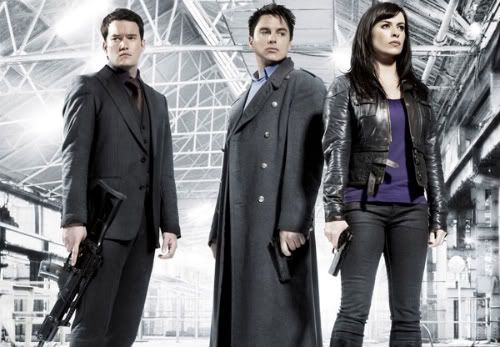
(Previously, on EW! A Blog: Day One | Day Two | Day Three | Day Four)
Here there be spoilers. Almost nothing but spoilers, really.
Four Things About Day Five *
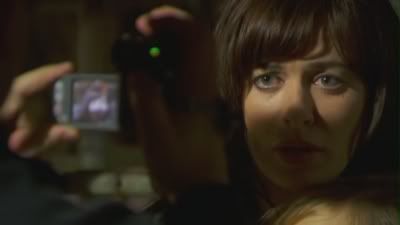
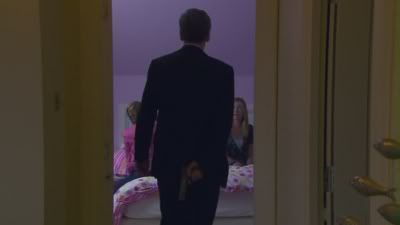
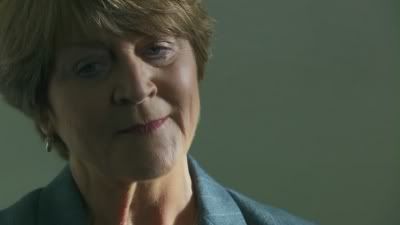
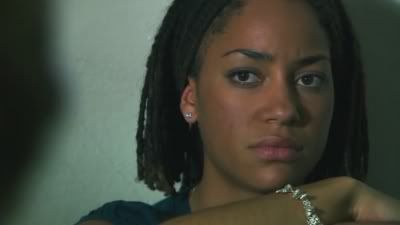

In at least one case, I’ve seen someone say that Jack’s decision to sacrifice his grandson in order to defeat the alien threat makes him evil. And while it might sound a little callous, I couldn’t agree less. I’ve also seen a lot of argument that the reasoning behind Ianto’s death is that it breaks Jack’s spirit to the point where he can make the choice to use Stephen as his only weapon against the 456. I don’t think I can quite get behind that, either, though I do think it’s a factor.
The thing about Jack is, he’s immortal. He’s a fixed point in time and space. And I suspect that a life that long would most likely involve learning some deeply uncomfortable truths about humanity, brevity and realism (though the Doctor on Doctor Who seems to have taken a different view of things). From his perspective, humans, ordinary ones, live tiny little lives — not in scale but in length, in duration. This is pretty clear in his conversation with Ianto earlier in Children of Earth, and it’s something Ianto accepts when he goes to Thames House with Jack. But as much as Jack can be aware that he’s going to outlive everyone he loves, the way it actually goes down can never be pleasant.
And so Jack is Jack, guarded, secretive, a little distant, a little cruel when he has to be, when the fate of the world is at stake. This is clear when he gives the child to the fairies in season one: Practically speaking, if one could disengage one’s heart from the scenario entirely, it’s the safer thing to do, the thing that makes the most sense for the most people.
Practically speaking, if one could get utter distance from it, sacrificing Stephen so that millions of other children can live is the thing that makes the most sense to save the most people.
But it’s horrible. And that’s why Children of Earth is so good: It doesn’t shy away from the truly horrible, and from the idea that sometimes horrible things might be necessary. It even wraps in the fact that doing these horrible, necessary things will be utterly damaging to the people who do them. Jack, besides being guarded and pragmatic, is a lover and a fierce friend, a father and a certain kind of romantic. He’s always at odds with himself, and he’s the leader; he has to combine those aspects of his personality into one force to lead Torchwood. What he has to do to save the world at the end of Day Five is likely to push those pieces apart, to make him wrap the caring part of himself in wool and stuff it in the attic. When he can’t look at Gwen — even before the horrible fate of Stephen — it’s because she’s been, since day one, the conscience, the part of Torchwood that remembers the individuals in each case, each strange phenomenon. He looks at her, and he sees those kids.
But back to the question of evil, and the end. What makes it so fascinating, to my mind, is that it’s so contrary to what so many stories — possibly especially science fiction and fantasy stories, the ones in which the best and worst of humanity are extended to dramatic lengths — tell us. So often, the right end is brought about because someone makes the noble decision, the decision made out of immediate, personal love, out of faith in one’s friends; the heroes make the “right” decision, the one that’s incredibly difficult and puts the world in jeopardy! — except it always works out in the end. Buffy isn’t willing to trade Willow for the box full of the Mayor’s nasty spiders, but they defeat the giant snake anyway. Luke makes the personal choice, the obstinate choice to think of his friends first, but the Death Star still gets blown up.
Jack makes the awful choice. The one that hurts him, personally; the one that pushes him away from his only family. He makes the ugly choice, the brutal choice, the inevitable choice, and the only choice that would really save the world. Things don’t always work out for the best. Ianto’s death was proof of that. Choosing out of love isn’t going to keep the universe out of danger every time. (Harry Potter this is not.) This is the truly bleak part of Children of Earth: The nasty, awful honesty of Jack’s “choice”: He didn’t actually have one. And it’s possible only Jack could have faced that situation and known he didn’t really have any other option; this is where the horrible truths of being immortal come into play. If the lives of ordinary humans are so short, is it less terrible, in the mind of the immortal, when one dies? And is it more terrible when that one is your own flesh and blood, and you’ll carry the memory of killing him forever? (Would it be less awful for anyone but Jack and Alice if they’d somehow found another child? Would it be “better,” somehow? Less evil, to those who think it was evil?)
And as for the theory that Ianto had to die so that Jack would be capable of using Stephen as a tool rather than a child, honestly, I think the opposite might be true. It would’ve been worse were Ianto there to see Jack’s decision. It would be worse for Jack, to have to kill his grandchild, lose his daughter and have Ianto look at him with horror. It wouldn’t be worse for Ianto, obviously, to have his illusions about Jack’s capabilities destroyed; one assumes that would be preferable to death. But it would make the final scenes even more heartbreaking. As it is, Jack saves the world and damns himself. There’s no hero’s ending for the man who’s a hero to millions.
Bravo, Torchwood. Sure, the series is imperfect — the storytelling stammers a bit, dragging in Day Four and rushing in Day Five, among other problems — but Children of Earth is a grand achievement.
* I’m totally going to think of a fifth thing after I post this. It’s practically inevitable.